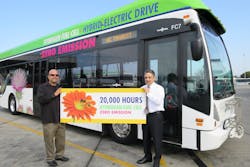AC Transit Fuel Cell Bus Exceeds 20,000 Hours of Service
A fuel cell installed in an Alameda-Contra Costa Transit District’s (AC Transit) bus set a record-breaking milestone — 20,000 hours of continuous operation. The fuel cell, manufactured by UTC Power, was not expected to operate beyond 5,000 hours, or about one year of service for an AC Transit bus.
With 20,000 hours of zero emission service, AC Transit’s quiet-running fuel cell bus has helped to improve the overall air quality, dramatically reducing the amount of noise and pollution in the communities it serves. By itself, the fuel cell bus has removed 1,134,000 pounds of CO2 from the atmosphere-- equivalent to planting 13,189 trees or taking 108 passenger vehicles off the road for one year.
AC Transit currently operates 12 of these zero emission buses that together have logged more than 150,000 hours of service.
AC Transit has been running zero emission fuel cell buses in the San Francisco Bay Area since 2001. In 2005, AC Transit took delivery of three Van Hool fuel cell buses embedded with UTC Power’s 120 kW PC40 fuel cell powerplant. In 2010, two of the fuel cells were transferred into new buses that AC Transit acquired as part of a consortium of San Francisco bay area transit agencies, known as Zero Emission Bay Area (ZEBA).
AC Transit’s 20,000-hour milestone demonstrates the potential for fuel cells to meet the high standards for durability and reliability in public transit. AC Transit is proving that hydrogen and fuel cells are working to reduce air pollution and greenhouse gases.
“The fuel cell bus is a workhorse, quietly and cleanly logging thousands of passenger miles over the years and still going strong," said California Air Resources Board chair Mary D. Nichols. "CARB's strategic investment in this demonstration project has shown that hydrogen fuel cells are a viable option for transit agencies in tough, demanding applications. I look forward to many more of these buses rolling out across the state as California communities strive to reach our clean air and climate protection goals."
The Center for Transportation and the Environment obtained a $1.8 million grant from the Federal Transit Administration in 2013 to provide continuing service and support for AC Transit’s fuel cell bus fleet through 2016. Dan Raudebaugh, CTE’s Executive Director, said, “The performance of AC Transit’s fuel cell fleet is impressive and clearly leading the way to commercialize fuel cell technology. CTE is proud to be working cooperatively with AC Transit and its professional staff to help maintain this critically important program.”
AC Transit initiated its fuel cell bus program in 2005, including the procurement of its 20,000-hour fuel cell, with funding from the California Air Resources Board and the California Traffic Congestion Relief Program that was administered by the California Transportation Commission.
“AC Transit and its employees are proud to be world leaders in advancing zero-emission technologies. Our community has been very supportive of our leadership role and the deployment of these clean, quiet buses throughout the neighborhoods we serve,” said Kathleen Kelly, AC Transit’s interim general manager.
